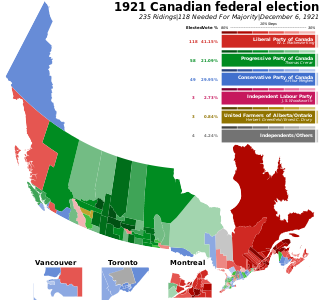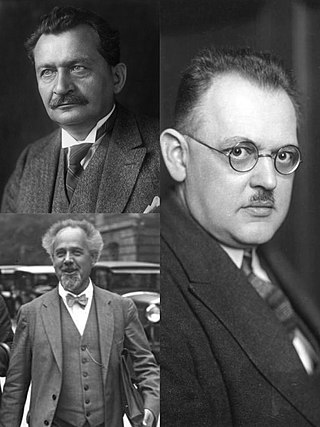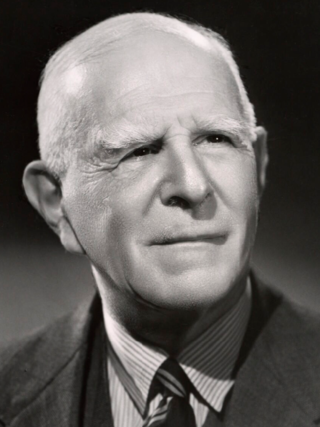| |||||||||||||||||||||
| |||||||||||||||||||||
| |||||||||||||||||||||
The 1919 Oxford University by-election was held on 19–24 March 1919 after the incumbent Coalition Conservative MP, Rowland Prothero was created as the first Lord Ernle. It was retained by the Conservative candidate Prof. Charles Oman. [1]
| |||||||||||||||||||||
| |||||||||||||||||||||
| |||||||||||||||||||||
The 1919 Oxford University by-election was held on 19–24 March 1919 after the incumbent Coalition Conservative MP, Rowland Prothero was created as the first Lord Ernle. It was retained by the Conservative candidate Prof. Charles Oman. [1]
| Party | Candidate | Votes | % | ±% | |
|---|---|---|---|---|---|
| C | Unionist | Charles Oman | 2,613 | 52.52 | −28.08 |
| Liberal | Gilbert Murray | 1,330 | 26.73 | +13.39 | |
| Independent | J. Athelstan L. Riley | 1,032 | 20.74 | New | |
| Majority | 1,283 | 25.79 | −41.47 | ||
| Turnout | 4,975 | 62.92 | −7.35 | ||
| Registered electors | 7,907 | ||||
| Unionist hold | Swing | ||||
| Cindicates candidate endorsed by the coalition government. | |||||

The 1921 Canadian federal election was held on December 6, 1921, to elect members of the House of Commons of Canada of the 14th Parliament of Canada. The Union government that had governed Canada through the First World War was defeated, and replaced by a Liberal government under the young leader William Lyon Mackenzie King. A new third party, the Progressive Party, won the second most seats in the election.
There have been various groups in Canada that have nominated candidates under the label Labour Party or Independent Labour Party, or other variations from the 1870s until the 1960s. These were usually local or provincial groups using the Labour Party or Independent Labour Party name, backed by local labour councils made up of many union locals in a particular city, or individual trade unions. There was an attempt to create a national Canadian Labour Party in the late 1910s and in the 1920s, but these were only partly successful.
The Progressive Conservative Party of Manitoba is a centre-right political party in Manitoba, Canada. It is currently the opposition party in the Legislative Assembly of Manitoba, following a defeat in the 2023 provincial election.

Baron St Oswald, of Nostell in the West Riding of the County of York, is a title in the Peerage of the United Kingdom. It was created in 1885 for the industrialist and Conservative politician Rowland Winn, a former Member of Parliament for North Lincolnshire. His son, the second Baron, represented Pontefract in the House of Commons. His grandson, the fourth Baron, held junior ministerial positions in the Conservative administrations of Harold Macmillan and Alec Douglas-Home and also sat as a Member of the European Parliament. As of 2017 the title is held by the latter's nephew, the sixth Baron, who succeeded his father in 1999.
This article gives an overview of liberalism and radicalism in Hungary. It is limited to liberal and radical parties with substantial support, mainly proved by having had a representation in parliament. The sign ⇒ denotes another party in that scheme. For inclusion in this scheme it is not necessary that parties labeled themselves as a liberal party.
Liberalism in Serbia is limited to liberal parties with substantial support, mainly proved by having had a representation in parliament. The sign ⇒ denotes another party in that scheme. For inclusion in this scheme it is not necessary so that parties labeled themselves as a liberal party.
Several political groupings functioned in the Dominion of Newfoundland under the name Liberal Party of Newfoundland from the granting of responsible government to the island in the 1850s until its suspension in 1934 when the Commission of Government was instituted. During that period, Newfoundland was an independent dominion within the British Empire, responsible for its own internal affairs.

The 1919 Ontario general election, held on October 20, 1919, elected 111 Members of the 15th Legislative Assembly of Ontario ("MLAs"). The United Farmers of Ontario captured the most seats but only a minority of the legislature. They joined with 11 Labour MPPs and three others to form a coalition government, ending the 14-year rule of Ontario's Conservatives. This is one of the few examples of coalition government in Canadian history.

The 1923 Ontario general election was the 16th general election held in the Province of Ontario, Canada. It was held on June 25, 1923, to elect the 111 Members of the 16th Legislative Assembly of Ontario ("MLAs").

Federal elections were held in Germany on 20 May 1928 to elect the fourth Reichstag of the Weimar Republic.

The Romanian Ministry of Foreign Affairs is the ministry responsible for external affairs of the Romanian Government. The current foreign minister is Luminița Odobescu.
The 15th Legislative Assembly of Ontario was in session from October 20, 1919, until May 10, 1923. The parliament was elected in the 1919 Ontario general election and was dissolved prior to the 1923 general election. The leading party in the chamber after the election was the United Farmers of Ontario (UFO). It formed a coalition government with 11 Labour MLAs and three Independent candidates of varying stripes.
The 1919 Aberdeenshire and Kincardine Central by-election was a parliamentary by-election held for the British House of Commons constituency of Aberdeenshire and Kincardineshire Central on 16 April 1919.
The Conservative Catholics were a right-wing conservative political party in Italy, composed by strong conservatives and clericalists.
Elections to Liverpool City Council were held on Wednesday 1 November 1922.
Elections to Liverpool City Council were held on 1 November 1921.
Elections to Liverpool City Council were held on 1 November 1919.
Because the First World War was still underway at the date of the election, under the terms of the Parliament and Local Elections Act, 1918, the term of office of the members of the Council were extended by one year.

An election to the County Council of London took place on 7 March 1946. The council was elected by First Past the Post with each elector having two votes in the two-member seats. The Labour Party once more made gains, again increasing their majority over the Conservative Party.